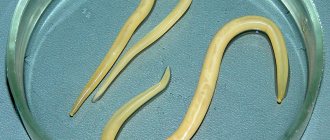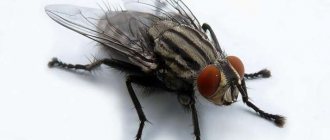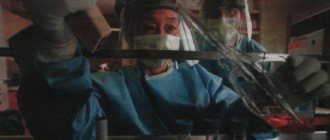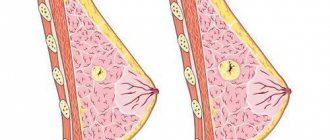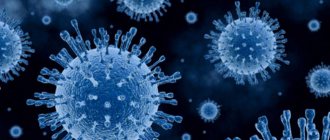Briefly about helminths
Infection with ascariasis is possible at any age, so helminths pose a threat not only to children. They reproduce actively. A female can lay more than 200 thousand eggs in just one time, which do not exceed 7 hundredths of a millimeter in size. It is impossible to notice them with the naked eye.
After the migration path, roundworms settle both in the small intestine and in the lungs or heart. This can often be fatal for a person. So, for example, such cases are still not uncommon on the African continent due to people’s failure to comply with basic sanitary standards.
Nature of the disease and life cycle
Ascaris lumbricoides, or human roundworm, is a round nematode and can only live in the human body. Other members of this species are characteristic of certain animals. Male adult human roundworms can reach 25 cm in length, and females grow up to 40. Round and pale pink worms, about 0.5 cm thick, can live in the human body for up to 2 years. The cuticle (a specific multilayer membrane) covers the body of the helminth, protecting it from exposure to human secretory fluids. While parasitizing the small intestine, the roundworm does not attach to its walls because it does not have special adaptations.
Constant movement in the direction opposite to the flow of food allows the roundworm to remain in the intestines, so that only dead individuals and eggs produced by the female come out with the feces. Fertilization occurs sexually, and it requires individuals of both sexes. In tropical countries, about half the population is infected with this type of worm, but in temperate climates, ascariasis is a fairly common phenomenon. An adult female is capable of reproducing about a quarter of a million eggs per day, which are released from the infected organism along with feces and can remain in the soil for several years, waiting for their chance to complete the life cycle.
If conditions are favorable, then a larva hatches from the egg, which, having gone through a certain stage of development, with the chance given to it, enters the human body, where it reaches maturity in order to lay “offspring” again. The larvae pass through the body through the portal vein system:
- liver;
- inferior vena cava;
- right atrium;
- lungs;
- pulmonary capillaries;
- pulmonary alveoli.
Having developed in the lung tissue, they rise to the trachea, and from there they enter the oral cavity, from where they are swallowed into the intestines. After about 2 months, a full-fledged adult individual is already present in the human body, capable of producing 250 thousand eggs daily after mating. Ascaris, being a frequent companion of humans and one of the most common intestinal parasites, is one of the helminths that pose a direct danger to its main host.
Symptoms of the presence of roundworm in the body
People can notice that something is wrong with the body even 3 days after they become infected. Although it all depends on the number of roundworms: the more there are, the faster the disease will manifest itself. A short time after roundworm infection occurs, a person feels general weakness and quickly gets tired. In fact, worms take away all the useful microelements and vitamins from food, and also poison the body of their owner.
When the parasite damages the intestinal walls, the patient complains of pain in the intestine. I am worried about nausea and vomiting often. Vision problems may begin, as roundworms contribute to improper absorption of vitamin A.
Ascariasis often leads to coughing attacks with bloody discharge. Sometimes parasite larvae can even be found in mucus. A rash may appear on the skin. An allergy sufferer may experience increased body temperature, enlarged lymph nodes, and insomnia.
Possible complications and immediate danger
Ascaris lumbricoides are exclusively human worms, which, unlike many other sources of invasion, are capable of infecting not only the intestines - their usual habitat. Many organs and systems of the human body can suffer from invasion, because their complex development path involves migration and potentially the possibility of living in the respiratory system, the gastrointestinal tract, and even the circulatory system. The larval stage means a short stay in other organs, and mature individuals tend to live in the small intestine. But the weakening of a person’s natural immunity leads to massive helminthic infestation, and the total dominance of parasites becomes a reason for roundworms to live in:
- gallbladder and bile ducts;
- small and large intestines;
- stomach and esophagus;
- liver;
- pancreatic ducts;
- heart;
- lungs and bronchi.
Pathological accumulations of roundworm larvae can be found in the most unexpected places, creating separate cavities that resemble abscesses. The larvae are prudently preserved in them, waiting for the opportunity to begin the development cycle when the appropriate conditions are present. The danger that worms pose to their main hosts - people, due to their prevalence and the possibility of infection, present at literally every step, is enormous. Therefore, they are difficult to compare with any other helminthic infestations.
Main routes of infection
Most people panic when they learn that they have worms, because childhood is behind them, and hygiene rules are always followed. In fact, the parasite is not only transmitted after sleeping with a sick person. Adults, just like children, very rarely follow all the rules of hygiene and are quite careless about sanitary standards. But even the usual consumption of cucumber from your own garden can cause ascariasis.
Let's look at the main routes of infection with roundworms.
Water
The route of transmission of roundworm eggs to humans is possible through water, where the parasites can maintain their vital activity for a long time. It is very easy for a person to become infected; for example, if you swim in polluted waters that are unsuitable for this, you can accidentally ingest parasites.
Also, drinking untreated water from an untested source can cause helminthiasis. There are known cases where infection occurred due to the use of ordinary tap water. And the fact that you can drink from a river or other unknown source is out of the question!
Contact with animals
Is it possible to become infected with roundworms through contact with animals? It is considered impossible. If a pet owner notices white worms in his pet’s feces, he believes that these are roundworms, but in fact they are representatives of the Toxocara helminth species. These parasites are no less dangerous to humans.
You can become infected with any parasites only if you pet a pet that has just been walking outside, or a street animal, do not wash your hands, and then sit down at the table.
Domestic infection
Ascaris eggs are found almost everywhere. They can be on banknotes, handrails in transport, on railings in public places, or on the hands of another person. Therefore, it is very easy to become infected with them in everyday life. For example, a helminth egg can be carried into an apartment on shoes. Then it gets on food or ends up on dishes and other household items. And eventually settles in the human body.
Dirty hands, especially in children, are another way roundworms are transmitted. There, on the hands and under the nails, they multiply. Children playing in the sandbox can accidentally pick up animal feces that contain parasite larvae. Then, with dirty hands, grab the mouth or treat, thereby transferring the larvae to the stomach.
In addition to infection from person to person, roundworms can also be transmitted through flies, which, when entering the house, bring with them the larvae of parasites.
People also become infected with roundworms in their own gardens if they do not use gloves when cultivating the soil, especially after fertilizing with animal feces. Both agricultural workers and vegetable sellers are susceptible to infection.
Unfortunately, the routes of transmission of parasites are numerous, and it is almost impossible to completely eliminate the risk through contact and household methods, even with scrupulous observance of all hygiene rules.
Airborne
Infection with roundworms through saliva and sputum is unlikely. But if certain conditions are met, it is possible. Roundworms must begin migrating at a specific moment and be in the lungs, throat or mouth of an infected person. And it is at this moment that there should be contact between an infected and a healthy person.
Food contamination
Are roundworms transmitted through food? Of course, people can become infected with them through almost any food product. These are unwashed vegetables and fruits, dried fish, poorly thermally processed meat and fish.
Many people, at least once in their lives, have eaten an unwashed fruit or vegetable that was fresh from the garden or tree, or even from the ground. And this is a big risk. How can you infect yourself with ascariasis? It is enough to eat roundworm larvae with juicy fruit. The same risk of getting sick appears when a person tastes food at the market.
Re-infection
After the first infection with human roundworm, the infected person does not develop immunity. If the larvae re-enter the body, they begin to actively reproduce, and probable helminthiasis begins anew.
Prevention
In order to avoid helminthiasis, you need to follow a few simple rules:
- Wash your hands before eating and after walking.
- Do not drink tap water.
- Avoid swimming in polluted lakes and rivers.
- Keep the house in order, constantly wipe the floors.
Simple rules of prevention will help reduce the risk of ascariasis.
By knowing how roundworms are transmitted, you can protect yourself and your family. The patient must study the transmission routes of roundworms and direct his efforts to preventive measures. Then the risk of developing helminthiasis is reduced several times.
The importance of treatment for ascariasis
If there is a suspicion or an accurate diagnosis of ascariasis, there is no need to self-medicate. Only a doctor can prescribe an effective treatment regimen, taking into account the characteristics of a particular patient’s body. All medications for helminthiasis are very toxic to parasites and the person himself. In some cases, even hospitalization may be required, so the disease cannot be neglected, otherwise you can infect internal organs with helminths and “earn” a chronic disease.
Preventive actions
Today, almost any disease can be treated. And if you don’t forget about prevention, you may be able to avoid infection with ascariasis.
And for this:
- Always wash your hands after visiting the sanitary room, traveling in public transport and after a regular street walk. If it is not possible to wash your hands, purchase an antibacterial spray so that you can clean your hands in such a situation.
- Nails should always be clean, no dirt underneath them. Do not bite your nails under any circumstances and wean your children from this habit.
- Wash and iron bedding regularly.
- When cleaning, pay special attention to the bathroom and toilet. If there is a pet in the house, then the number of cleanings will have to be increased, especially if the animal walks outside. So that you are not afraid of any types of infection, carry out the so-called general cleaning using antibacterial cleaning products.
- Change your toothbrush regularly and wash it before and after brushing.
- Naturally, get tested periodically to determine whether there are helminths in your body. Such tests are required before important events - pregnancy, surgery.
And knowledge about roundworms and how you can become infected with them will allow you to avoid the consequences of their life activity.
